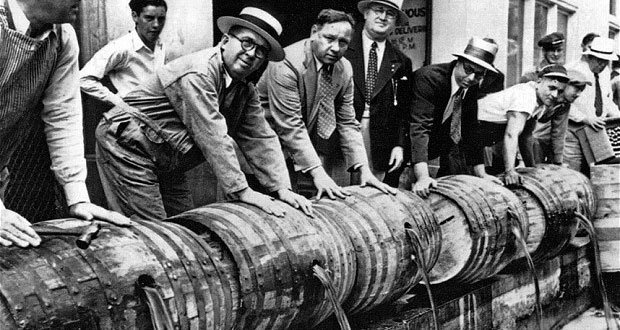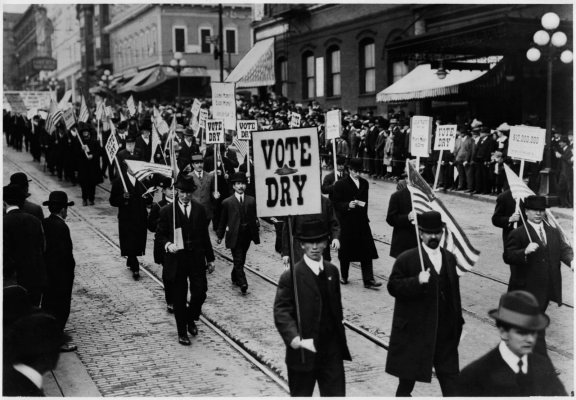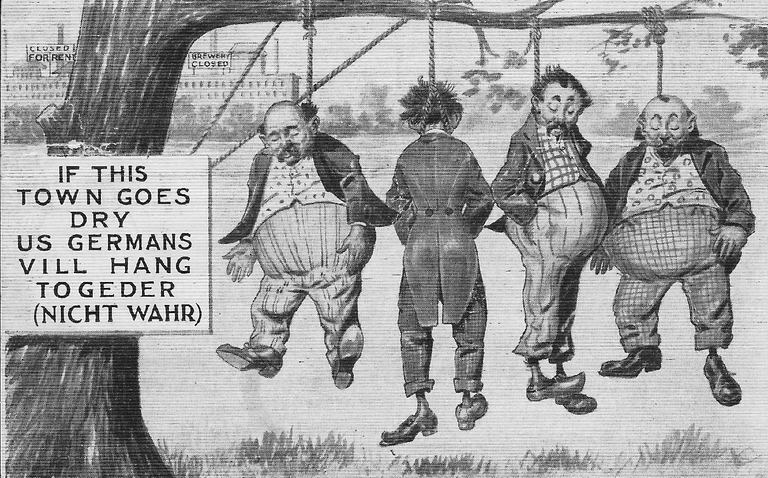
In 1918, Congress passed the 18th Amendment to the Constitution, prohibiting the manufacture, transportation, and sale of alcoholic beverages. The next year, States ratified the Amendment, which led to the subsequent 13 years Prohibition in the United States.
The simmer of alcohol prohibition started from wartime since the US declared war on Germany in April 1917, and was passed in 1918 at the very end of the war. However, the Lever Act August 1917 had already banned distilled spirits production in order to guarantee supplies of grain for food production. By 1919, just before the Volstead Act went into effect nationally, 27 states had enacted full prohibition laws.

The wartime hostility toward Germans thus helped the rise of prohibition. The beer brewing industry in the US was dominated by industrious German immigrant community by that time. Thus anti-German sentiment played a significant part on extending prohibition in wartime. The Anti-Saloon League and the Woman’s Christian Temperance Union are prominent pushing hands behind the prohibition, as the main male and female organization by that time. Additionally, the movement cultivated an anti-alcohol culture long instilled among middle-class people in a wide serials of area, mostly people in small towns, the churches and their allies in the rural population, and also some urban progressives who deem alcohol as a cause of inefficiency, poverty and social disputation in American life.

The war also gave people a chance to align their movement with nationalism and its crusading spirit of self-sacrifice. Thus when it came to alcohol prohibition, which they believed would make US better, they showed their advocacy in all means. Businessmen such as Henry Ford supported prohibition because of the economic benefit he could get from a more efficient factory staff. The prosper of alcohol prohibition greatly revealed the progressivism and anti-alcohol sentiment in the society. It helps illustrate the inevitability of prohibition as a social reform movement.
Reference:
https://iantyrrell.wordpress.com/alcohol-prohibition-in-the-usa/
https://www.ghi-dc.org/fileadmin/user_upload/GHI_Washington/Publications/Bulletin53/bu53_031.pdf
https://en.wikipedia.org/wiki/Prohibition_in_the_United_States
Hi! I am a robot. I just upvoted you! I found similar content that readers might be interested in:
https://iantyrrell.wordpress.com/alcohol-prohibition-in-the-usa/
by the way, it was the only lei that was revoked since they realized that they generated more profits with the taxes collected by selling it as well as ending the traffic and the empire of al capone
Haha yeah I guess so, if you look at that through the capital lens.
It seems 1918 is the year that keeps on giving us great stories!
I wonder if any other nation went dry, or was it only a US thing?
The history of prohibition and repeal provides an interesting lens into today's debate over "Sanctuary Cities." Surprisingly, it's also relevant to the use of modern electronic surveillance techniques. Although the 18th amendment was eventually repealed, it still has lasting and far-reaching consequences. I wrote this article on the topic a few years ago.
cheetah's link below).Hi @landy-yinan. Please make sure to provide proper sources for quotes and all excerpts of text (see
Really sorry about that! I've added the reference.